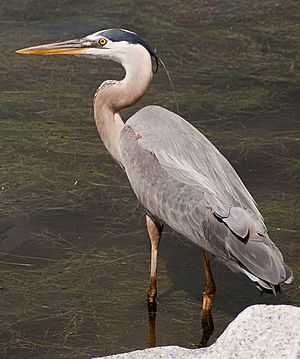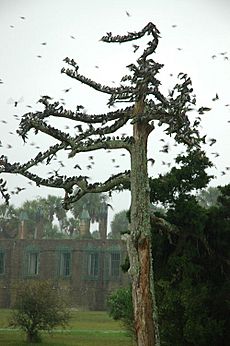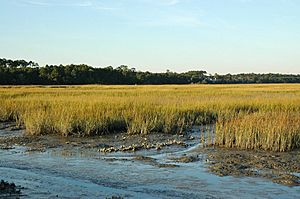Huntington Beach State Park facts for kids
Quick facts for kids Huntington Beach State Park |
|
|---|---|

Great blue heron (Ardea herodias) at Huntington Beach Park
|
|
| Nearest city | Murrells Inlet, Georgetown County, South Carolina |
| Area | 2,500 acres (10.1 km2) |
| Camp sites | 107 30 Amp standard campsites 21 30 Amp full service campsites 42 50 Amp full service campsites 6 walk-in tent sites |
| Hiking trails | 2 |
Huntington Beach State Park is a fantastic coastal park in Murrells Inlet, South Carolina. It covers 2,500 acres, which is about 10 square kilometers! This park is a wonderful spot for nature lovers. You can enjoy a big sandy beach, watch many different wild birds, and explore beautiful natural areas.
Contents
Discover Huntington Beach State Park
Huntington Beach State Park is a special place. It's known for its amazing wildlife and beautiful coastline. It's a perfect spot for families and anyone who loves the outdoors.
A Look Back: Park History
This park was once owned by a famous couple, Anna Hyatt Huntington and Archer M. Huntington. They were very important people in art and conservation. After Archer Huntington passed away, the land was leased to the state in 1960. It became a state park named after him.
Atalaya Castle and Brookgreen Gardens
The Huntingtons' winter home, called Atalaya Castle, is right inside the park. It was built during the Great Depression by local workers. The castle was designed to be super strong, even against hurricanes!
Anna Hyatt Huntington was a famous sculptor. Her art studio was part of the castle. Many of her amazing sculptures are now displayed nearby at Brookgreen Gardens. This garden was once part of the Huntington estate. Today, it's a public sculpture garden where everyone can enjoy art and nature.

What Can You Do Here?
There's so much to see and do at Huntington Beach State Park! You can take guided tours of Atalaya Castle. The Atalaya Visitor Center also has cool exhibits about the castle and the Huntington family.
Amazing Bird Watching
Many bird watchers call the park "HBSP" for short. It's one of the best places to see birds on the Southeast coast! You can spot many types of ducks and waders, like colorful roseate spoonbills. These birds visit the park's marshes in winter.
Near the jetty, you might see ocean birds like gannets and loons. Sometimes, even rare birds like razorbills appear! Huge flocks of tree swallows also gather here.
Explore the Nature Center
The Nature Center is a fun place to learn about local wildlife. It has displays about nature and even live animals. You can touch sea creatures in a saltwater touch pool. There's also a live baby alligator to see!
Park naturalists offer free programs. They teach visitors about the park's animals and plants. The center is located next to the salt marsh. It has a boardwalk where you can explore the marsh up close.
Sadly, the original Nature Center was destroyed by a lightning strike in 2016. All the animals inside were lost. But don't worry! The center was rebuilt and reopened in September 2020. It's now open every day from 10 AM to 5 PM.
Other Fun Activities
Besides bird watching and the Nature Center, there are many other things to do. You can relax on the beautiful beach or walk along the jetty. The park also has hiking and nature trails. There are boardwalks that let you explore different habitats. Don't forget to check out the gift shop for souvenirs! If you love camping, the park has a public campground too.
More Places to Explore
- Atalaya Castle
- Brookgreen Gardens — a sculpture park right next door.
- Anna Hyatt Huntington
 | Tommie Smith |
 | Simone Manuel |
 | Shani Davis |
 | Simone Biles |
 | Alice Coachman |


